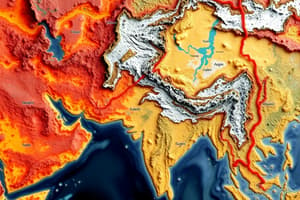Podcast
Questions and Answers
What does environmental geography examine?
What does environmental geography examine?
- The complex interactions between the natural environment and human activities (correct)
- The complex interactions between political and cultural systems
- The complex interactions between social and economic systems
- The complex interactions between institutional and technological systems
What is analyzed in political ecology?
What is analyzed in political ecology?
- The role of social movements in environmental governance
- The impact of economic systems on the environment
- The relationship between power relations, political and economic systems, and environmental outcomes (correct)
- The effects of climate change on human migration
What is the benefit of integrating environmental geography and political ecology?
What is the benefit of integrating environmental geography and political ecology?
- Creating more complex and nuanced understandings of environmental challenges (correct)
- Focusing on a single approach to environmental research
- Designing more effective solutions to environmental problems
- Developing more specialized knowledge in either field
What is the goal of formulating research questions in environmental research?
What is the goal of formulating research questions in environmental research?
What is critical in evaluating sources in environmental research?
What is critical in evaluating sources in environmental research?
What is the primary focus of environmental geography?
What is the primary focus of environmental geography?
What is the main objective of political ecology?
What is the main objective of political ecology?
When did political ecology emerge as a critical approach to environmental issues?
When did political ecology emerge as a critical approach to environmental issues?
What is the ultimate goal of this course?
What is the ultimate goal of this course?
What is the interdisciplinary approach of this course?
What is the interdisciplinary approach of this course?
What is the primary focus of environmental geography?
What is the primary focus of environmental geography?
What is the ultimate goal of applying critical thinking to environmental problems in environmental geography?
What is the ultimate goal of applying critical thinking to environmental problems in environmental geography?
What is the scope of political ecology in the context of environmental geography?
What is the scope of political ecology in the context of environmental geography?
What is the outcome of understanding the foundational concepts of environmental geography?
What is the outcome of understanding the foundational concepts of environmental geography?
What is the role of scale in environmental geography?
What is the role of scale in environmental geography?
What is a significant consequence of urban sprawl and loss of farmland?
What is a significant consequence of urban sprawl and loss of farmland?
What is a major driver of deforestation in the Amazon rainforest?
What is a major driver of deforestation in the Amazon rainforest?
What is a significant environmental impact of plastic pollution in the oceans?
What is a significant environmental impact of plastic pollution in the oceans?
What is the result of the melting of glaciers in the Arctic region?
What is the result of the melting of glaciers in the Arctic region?
What is a key strategy for enhancing soil health and biodiversity?
What is a key strategy for enhancing soil health and biodiversity?
What percentage of global ecosystems is affected by human impacts, according to the graph?
What percentage of global ecosystems is affected by human impacts, according to the graph?
Which of the following human impacts has the greatest effect on global ecosystems, according to the graph?
Which of the following human impacts has the greatest effect on global ecosystems, according to the graph?
What is the primary goal of sustainable urban design in the context of socio-ecological frameworks?
What is the primary goal of sustainable urban design in the context of socio-ecological frameworks?
What is the core principle of a circular economy, as mentioned in the context of socio-ecological frameworks?
What is the core principle of a circular economy, as mentioned in the context of socio-ecological frameworks?
Which of the following sustainable solutions is focused on reducing energy consumption in buildings, transportation, and industrial processes?
Which of the following sustainable solutions is focused on reducing energy consumption in buildings, transportation, and industrial processes?
What is the primary focus of systems theory in the context of environmental geography?
What is the primary focus of systems theory in the context of environmental geography?
Which theoretical framework examines the capacity of social-ecological systems to adapt and transform in the face of disturbances and environmental change?
Which theoretical framework examines the capacity of social-ecological systems to adapt and transform in the face of disturbances and environmental change?
What is the primary focus of socio-natures in the context of environmental geography?
What is the primary focus of socio-natures in the context of environmental geography?
What is the proposed geological epoch that acknowledges the significant impact of human activity on the Earth's ecosystems and natural systems?
What is the proposed geological epoch that acknowledges the significant impact of human activity on the Earth's ecosystems and natural systems?
What is the primary focus of ecological modernization in the context of environmental geography?
What is the primary focus of ecological modernization in the context of environmental geography?
What is a result of the incorporation of theoretical perspectives in research methodologies?
What is a result of the incorporation of theoretical perspectives in research methodologies?
What is challenged by theoretical perspectives in research methodologies?
What is challenged by theoretical perspectives in research methodologies?
What is a consequence of the blurring of human-machine boundaries?
What is a consequence of the blurring of human-machine boundaries?
What is a characteristic of posthumanism?
What is a characteristic of posthumanism?
What is an impact of incorporating theoretical perspectives in research methodologies?
What is an impact of incorporating theoretical perspectives in research methodologies?
What is a result of the transformation of epistemologies in research methodologies?
What is a result of the transformation of epistemologies in research methodologies?
What is one of the criticisms of certain theoretical perspectives in the social sciences?
What is one of the criticisms of certain theoretical perspectives in the social sciences?
What is a concern raised about many influential theoretical frameworks in the social sciences?
What is a concern raised about many influential theoretical frameworks in the social sciences?
What is a potential limitation of theoretical perspectives in the social sciences?
What is a potential limitation of theoretical perspectives in the social sciences?
What is a potential consequence of theoretical perspectives lacking empirical support?
What is a potential consequence of theoretical perspectives lacking empirical support?
What is a potential critique of theoretical perspectives that emphasize the socially constructed nature of reality?
What is a potential critique of theoretical perspectives that emphasize the socially constructed nature of reality?
What is a potential consequence of theoretical perspectives being influenced by the researcher's personal biases?
What is a potential consequence of theoretical perspectives being influenced by the researcher's personal biases?
What is the primary goal of employing participatory methodologies in development research?
What is the primary goal of employing participatory methodologies in development research?
What is a key aspect of contextual adaptations in development research?
What is a key aspect of contextual adaptations in development research?
Which theoretical perspective examines the legacy of colonialism and its impact on knowledge production?
Which theoretical perspective examines the legacy of colonialism and its impact on knowledge production?
What is the focus of Posthumanist Theory in academia?
What is the focus of Posthumanist Theory in academia?
What is the goal of community-based research and action-oriented approaches?
What is the goal of community-based research and action-oriented approaches?
What is a key aspect of Feminist Theory in academia?
What is a key aspect of Feminist Theory in academia?
What is the focus of Poststructuralist Theory in academia?
What is the focus of Poststructuralist Theory in academia?
What is the goal of contextual adaptations in development research, in terms of power dynamics?
What is the goal of contextual adaptations in development research, in terms of power dynamics?
What is the primary focus of political ecology?
What is the primary focus of political ecology?
What is a key aspect of ethical considerations in environmental issues?
What is a key aspect of ethical considerations in environmental issues?
What is the focus of political ecology in terms of marginalized communities?
What is the focus of political ecology in terms of marginalized communities?
What is the primary goal of political ecology?
What is the primary goal of political ecology?
What is a key aspect of ethics in environmental issues?
What is a key aspect of ethics in environmental issues?
What is the primary consequence of land acquisitions on indigenous communities and ecosystems?
What is the primary consequence of land acquisitions on indigenous communities and ecosystems?
What is the primary focus of developing informed arguments in the context of environmental decision-making?
What is the primary focus of developing informed arguments in the context of environmental decision-making?
What is the primary benefit of applying political ecology frameworks to real-world scenarios?
What is the primary benefit of applying political ecology frameworks to real-world scenarios?
What is the primary goal of cultivating critical thinking and dialogue in environmental decision-making?
What is the primary goal of cultivating critical thinking and dialogue in environmental decision-making?
What is the primary importance of recognizing the interconnectedness of social, ecological, and political systems?
What is the primary importance of recognizing the interconnectedness of social, ecological, and political systems?
What is the primary concern of addressing historical and ongoing disparities in environmental issues?
What is the primary concern of addressing historical and ongoing disparities in environmental issues?
How does political ecology inform the analysis of deforestation in the Amazon?
How does political ecology inform the analysis of deforestation in the Amazon?
What is the primary focus of analyzing the power dynamics underlying water scarcity and conflict through a political ecology lens?
What is the primary focus of analyzing the power dynamics underlying water scarcity and conflict through a political ecology lens?
What is the significance of examining the relationships between extractive industries, indigenous land rights, and environmental impacts?
What is the significance of examining the relationships between extractive industries, indigenous land rights, and environmental impacts?
What is the primary goal of using a political ecology lens to analyze land grabs?
What is the primary goal of using a political ecology lens to analyze land grabs?
Study Notes
Integrating Theory and Practice
- Environmental geography examines the complex interactions between the natural environment and human activities to understand spatial dynamics and contextual factors contributing to environmental issues.
- Political ecology analyzes how power relations, political and economic systems, and sociocultural factors shape environmental outcomes.
- Combining environmental geography and political ecology provides a comprehensive understanding of environmental challenges and enables the design of more effective and sustainable solutions.
Environmental Geography
- Environmental geography is a broad field that examines the complex relationships between human societies and the natural environment.
- It explores how the physical environment, including climate, landforms, and natural resources, influences and is influenced by human activities, such as urbanization, agriculture, and resource extraction.
- Key principles and approaches in environmental geography include the study of human-environment interactions, spatial analysis, and the role of scale.
Political Ecology
- Political ecology emerged as a critical approach to environmental issues in the 1970s, combining political economy and ecology.
- In the 1990s, political ecology expanded to examine issues of social justice, gender, and indigenous rights in environmental conflicts.
- By the 2010s, there was an increasing emphasis on the role of social movements in political ecology.
Course Objectives
- Understand the foundational concepts of environmental geography and political ecology.
- Analyze the political dimensions of environmental issues and apply critical thinking to environmental problems.
- Develop the ability to critically evaluate environmental problems, consider multiple perspectives, and propose innovative solutions grounded in geographic knowledge and principles.
Course Overview
- The course explores the complex relationships between human societies, natural environments, and political systems.
- It covers the spatial dimensions of environmental issues, socio-political processes, and an interdisciplinary approach to addressing environmental challenges.
- By the end of the course, students will have a comprehensive understanding of environmental geography and the political ecology of environmental issues, enabling them to tackle complex sustainability challenges.
Socio-Ecological Frameworks
- Socio-natures draws on interdisciplinary frameworks, such as political ecology and social-ecological systems, to analyze the dynamic relationships between social and natural elements.
Environmental Impacts
- Climate Change affects 90% of global ecosystems.
- Biodiversity Loss affects 85% of global ecosystems.
- Resource Depletion affects 80% of global ecosystems.
- Pollution affects 75% of global ecosystems.
- Habitat Destruction affects 65% of global ecosystems.
Sustainable Solutions
- Renewable Energy sources, such as solar, wind, and hydroelectric power, provide sustainable and clean alternatives to fossil fuels.
- Energy Efficiency can be improved through strategies and technologies that reduce overall energy consumption and environmental impact.
- Sustainable Agriculture practices, such as organic agriculture, regenerative techniques, and precision farming, minimize the use of synthetic fertilizers and pesticides while enhancing soil health and biodiversity.
- A Circular Economy aims to minimize waste through reuse, recycling, and repurposing of materials, creating a more sustainable and closed-loop system.
- Sustainable Urban Design strategies promote sustainable, livable, and environmentally-friendly cities, including green infrastructure, public transportation, and walkable communities.
Case Studies
- Deforestation in the Amazon Rainforest has significant implications for biodiversity, climate, and indigenous communities.
- Plastic Pollution in the Oceans is a global problem with major impacts on marine ecosystems.
- Urban Sprawl and Loss of Farmland results in the human-driven transformation of natural landscapes into built environments.
- Melting Glaciers in the Arctic are a visible indicator of climate change and its effects on fragile ecosystems and indigenous communities.
Theoretical Frameworks
- Systems Theory examines the interconnected and interdependent nature of human activities and natural systems, focusing on feedback loops and emergent properties.
- Environmental History explores the historical relationships between human societies and the natural world, including the long-term impacts of human activities on ecosystems.
- Political Ecology analyzes the power dynamics, social inequalities, and political forces that shape human-environment interactions and environmental change.
- Ecological Modernization examines how technological innovation, policy reforms, and market-based approaches can be leveraged to reduce the environmental impacts of human activities.
- Socio-Ecological Resilience investigates the capacity of social-ecological systems to adapt and transform in the face of disturbances and environmental change.
Socio-Natures
- The Anthropocene is a proposed geological epoch that acknowledges the significant impact of human activity on the Earth's ecosystems and natural systems.
- Socio-Natural Interactions examine the complex interplay between social, cultural, and political systems and the natural environment, leading to the co-production of hybrid landscapes.
- Coupled Human-Natural Systems recognize that human societies and natural systems are deeply intertwined, with feedback loops and mutual influences shaping the development of both.
The Rise of Qualitative and Interpretive Approaches
- The rise of qualitative and interpretive approaches in social sciences emphasizes the importance of understanding socially constructed realities.
- These approaches, including phenomenology, ethnography, and critical discourse analysis, acknowledge the role of the researcher in producing knowledge.
- They promote the idea of multiple, socially constructed realities and challenge dominant narratives.
Underrepresented Groups in Academia
- Women, people of color, and LGBTQ+ individuals have been able to bring their perspectives and experiences to the forefront, expanding the range of topics and approaches considered legitimate.
- This has led to the development of alternative epistemologies, such as social constructionism, critical theory, and feminist epistemology.
Challenges and Critiques
- Some critiques argue that certain theoretical perspectives lack empirical support and are overly abstract, making it difficult to apply them to real-world situations.
- Concerns have been raised that many influential theoretical frameworks are rooted in Western, Eurocentric traditions, potentially overlooking or undervaluing non-Western perspectives.
Interdisciplinary Research and Implications
- The incorporation of theoretical perspectives has led to the development of new research methodologies, such as participatory methodologies and contextual adaptations.
- These approaches have contributed to the diversification of knowledge production in academic fields, giving voice to marginalized communities.
- The incorporation of theoretical perspectives has transformed epistemologies, making research more interdisciplinary and collaborative.
Theoretical Perspectives in Academia
- Feminist theory explores the role of gender and power dynamics in academia, challenging traditional male-centric perspectives.
- Poststructuralist theory focuses on the deconstruction of language and power structures, questioning the notion of fixed identities and universal truths.
- Postcolonial theory examines the legacy of colonialism and its impact on knowledge production.
- Posthumanist theory rethinks the boundaries between the human, non-human, and more-than-human, exploring new ways of understanding.
Ethics, Entanglement, and Political Ecology
- Examines the complex relationships between humans, technology, and the environment
- Includes ethical considerations, entanglement, and political ecology
Ethical Considerations
- Examines the moral and philosophical frameworks that guide decision-making in environmental issues
- Includes justice, rights of marginalized communities, and equity
Justice
- Ensures fair and equitable distribution of resources, decision-making power, and access to environmental benefits and burdens for all members of society
- Includes marginalized communities
Rights of Marginalized Communities
- Protects the rights, traditional practices, and decision-making authority of indigenous peoples, ethnic minorities, and other marginalized groups
- Focuses on communities disproportionately affected by environmental degradation and policy decisions
Equity
- Addresses historical and ongoing disparities in how different groups are impacted by environmental issues
- Prioritizes the needs of the most vulnerable and disadvantaged
Entanglement
- Examines the complex interconnections and dependencies between natural, social, and political systems
- Includes social factors, political drivers, and complexity of socio-ecological systems
Political Ecology
- Analyzes the power dynamics, policies, and institutions that shape environmental outcomes
- Focuses on marginalized communities and their relationships with political, economic, and social factors
Real-World Scenarios
- Deforestation in the Amazon: complex drivers and competing interests behind deforestation, including economic development, indigenous land rights, and climate change mitigation policies
- Water Scarcity and Conflict: power dynamics, resource distribution, and environmental justice issues underlying water scarcity and cross-border water disputes
- Urban Green Spaces: design and management of urban green spaces, considering socioeconomic disparities, gentrification, and community engagement
- Extractive Industries and Indigenous Communities: complex relationships between extractive industries, indigenous land rights, and environmental impacts
Case Study: Land Grabs
- Large-scale acquisition of land by corporations or governments, leading to displacement of indigenous communities, destruction of fragile ecosystems, and concentration of wealth and power
Developing Informed Arguments
- Understand the ethical considerations and frameworks that inform political and ecological decision-making
- Analyze the impact of political decisions on environmental policies and their consequences for ecosystems and communities
- Recognize the interconnectedness of systems and foster critical thinking and dialogue on ethical dilemmas
Studying That Suits You
Use AI to generate personalized quizzes and flashcards to suit your learning preferences.
Description
This quiz explores the complex interactions between the natural environment and human activities, examining power relations and sociocultural factors. It combines insights from environmental geography and political ecology for real-world problem-solving.




